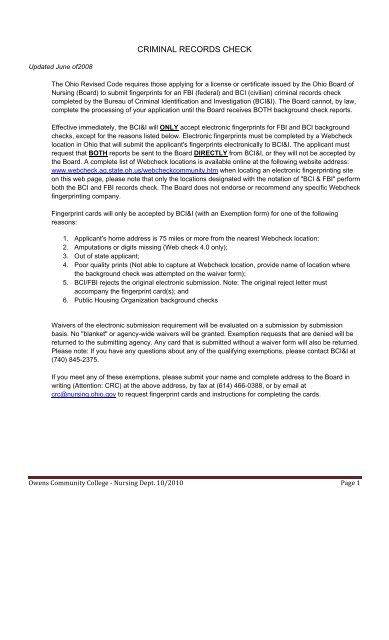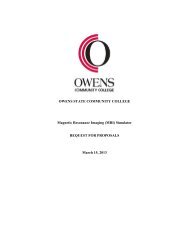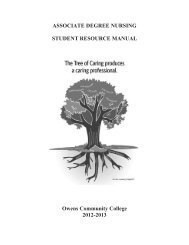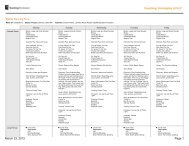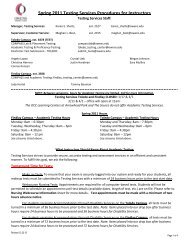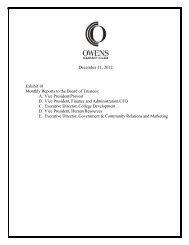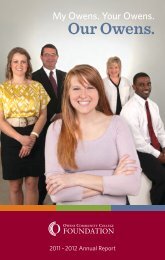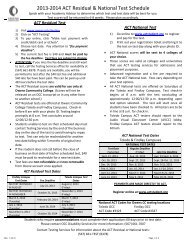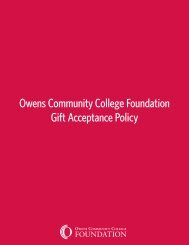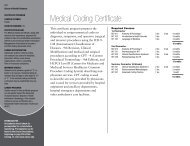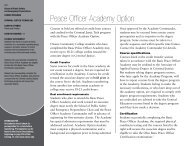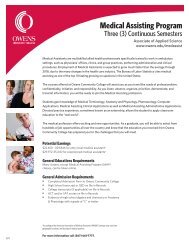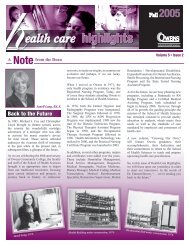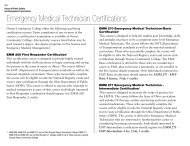CRIMINAL RECORDS CHECK - Owens Community College
CRIMINAL RECORDS CHECK - Owens Community College
CRIMINAL RECORDS CHECK - Owens Community College
Create successful ePaper yourself
Turn your PDF publications into a flip-book with our unique Google optimized e-Paper software.
<strong>CRIMINAL</strong> <strong>RECORDS</strong> <strong>CHECK</strong><br />
Updated June of2008<br />
The Ohio Revised Code requires those applying for a license or certificate issued by the Ohio Board of<br />
Nursing (Board) to submit fingerprints for an FBI (federal) and BCI (civilian) criminal records check<br />
completed by the Bureau of Criminal Identification and Investigation (BCI&I). The Board cannot, by law,<br />
complete the processing of your application until the Board receives BOTH background check reports.<br />
Effective immediately, the BCI&I will ONLY accept electronic fingerprints for FBI and BCI background<br />
checks, except for the reasons listed below. Electronic fingerprints must be completed by a Webcheck<br />
location in Ohio that will submit the applicant's fingerprints electronically to BCI&I. The applicant must<br />
request that BOTH reports be sent to the Board DIRECTLY from BCI&I, or they will not be accepted by<br />
the Board. A complete list of Webcheck locations is available online at the following website address:<br />
www.webcheck.ag.state.oh.us/webcheckcommunity.htm when locating an electronic fingerprinting site<br />
on this web page, please note that only the locations designated with the notation of "BCI & FBI" perform<br />
both the BCI and FBI records check. The Board does not endorse or recommend any specific Webcheck<br />
fingerprinting company.<br />
Fingerprint cards will only be accepted by BCI&I (with an Exemption form) for one of the following<br />
reasons:<br />
1. Applicant's home address is 75 miles or more from the nearest Webcheck location:<br />
2. Amputations or digits missing (Web check 4.0 only);<br />
3. Out of state applicant;<br />
4. Poor quality prints (Not able to capture at Webcheck location, provide name of location where<br />
the background check was attempted on the waiver form);<br />
5. BCI/FBI rejects the original electronic submission. Note: The original reject letter must<br />
accompany the fingerprint card(s); and<br />
6. Public Housing Organization background checks<br />
Waivers of the electronic submission requirement will be evaluated on a submission by submission<br />
basis. No "blanket" or agency-wide waivers will be granted. Exemption requests that are denied will be<br />
returned to the submitting agency. Any card that is submitted without a waiver form will also be returned.<br />
Please note: If you have any questions about any of the qualifying exemptions, please contact BCI&I at<br />
(740) 845-2375.<br />
If you meet any of these exemptions, please submit your name and complete address to the Board in<br />
writing (Attention: CRC) at the above address, by fax at (614) 466-0388, or by email at<br />
crc@nursing.ohio.gov to request fingerprint cards and instructions for completing the cards.<br />
<strong>Owens</strong> <strong>Community</strong> <strong>College</strong> ‐ Nursing Dept. 10/2010 Page 1
Q: If our clinical facilities require fingerprinting now, can that be used as the records check when it<br />
comes time for the graduate to apply for licensure?<br />
A: It depends. The following must be in place:<br />
The records check must be completed no earlier than 12 months prior to the time the<br />
OBN processes the application. The records checks are not valid after twelve (12) months. If<br />
fingerprinting is done for clinical course work fits within this time frame, this might be acceptable.<br />
The records check must be conducted by both the BCI and the FBI. At least one copy of the<br />
records check results must be received directly by OBN without going through a third<br />
party<br />
(e.g. WebCheck, or the nursing program). If two copies can be sent, one to the school, and one<br />
to OBN, fingerprinting done for clinical course work may be acceptable.<br />
Q: We have a fingerprint scanner at our program, or have made arrangements for fingerprinting to be<br />
done "en masse" for the students through the fingerprinting service. Will this serve the purpose for<br />
OBN?<br />
A: Yes, as long as the results come directly to OBN without going through a third party (e.g. WebCheck,<br />
or the nursing program.<br />
Q: What is the total cost to the student?<br />
A: Approximately $52.00 total.<br />
<strong>Owens</strong> <strong>Community</strong> <strong>College</strong> can provide the fingerprinting for students, the cost is $52.00 for<br />
the BCI&I and FBI checks, the forms are in the nursing office on the Toledo campus. Both the<br />
Findlay and Toledo campuses provide this service.<br />
Q: Ultimately, whose responsibility is it to have the fingerprinting done?<br />
A: The candidate is solely responsible for completing their own application, getting fingerprinted, and<br />
being certain that the results are sent to OBN.<br />
Q: What is required before the candidate can be authorized to schedule their NCLEX exam?<br />
A: OBN needs to have in the candidate's file:<br />
• The completed application<br />
• The two reports (BCI and FBI); and<br />
• the completion letter from the pre-licensure nursing education program with "entered" and<br />
"completed" dates from the program<br />
Q: Is there an exception to the "good for one year" rule of thumb on the fingerprinting?<br />
A: The completed candidate file is kept for one year, so their fingerprinting results will be kept in that file<br />
for one year. So, if the candidate takes NCLEX, fails, and makes application to retest within the year,<br />
the records check is still valid. If they do not make application to re-test within that one year, they will<br />
need to start over.<br />
<strong>Owens</strong> <strong>Community</strong> <strong>College</strong> ‐ Nursing Dept. 10/2010 Page 2
Requirements for application to the Ohio State Board of Nursing (OBN) for NCLEX -RN<br />
OBN <strong>CRIMINAL</strong> <strong>RECORDS</strong> <strong>CHECK</strong> AND FELONY<br />
PRECLUSION INITIATIVE<br />
SUMMARY OF RELEVANT PORTIONS OF HB 327<br />
Criminal Records Check<br />
Requirement<br />
BCI and FBI Checks<br />
Fee for the Criminal Records<br />
Check<br />
Requesting and Receiving<br />
Results<br />
NURSES (RN AND LPN) -EXAM<br />
The applicant must request a criminal records check from the state<br />
Bureau of Criminal Identification and Investigation (BCI), which includes<br />
an FBI check.<br />
BCI conducts a check of criminal records in Ohio. In order to acquire<br />
results of a check outside of Ohio, a check must also be made of FBI<br />
records (which can be done through BCI). The law expressly states that<br />
both must be done.<br />
The fee for conducting the check is approximately $52 and shall be paid<br />
by the applicant when making the request for the check to BCI. That fee<br />
includes both a FBI and BCI check.<br />
The request for the checks will be made to BCI by the individual (via<br />
submission of a fingerprint card.) The results of the records check will go<br />
directly to the Board from BCI.<br />
The fingerprint card used by an applicant to request a criminal records<br />
check contains a waiver that will allow the applicant to indicate where BCI<br />
shall send the results. The applicant will indicate that the results are to go<br />
to the Board of Nursing.<br />
Full Process Outlined 1. Applicant receives card from OBN or school.<br />
2. Applicant completes fingerprint card.<br />
3. Applicant sends card to BCI and makes the request/pays the fee.<br />
Card contains permission for BCI to give results to Ohio Board of<br />
Nursing.<br />
4. BCI sends results to OBN.<br />
Privacy Protection/Public Record<br />
Renewal<br />
The results of the criminal records check will not be public record, once<br />
under the control of OBN. The law specifically states that the criminal<br />
records check cannot go to anyone other than the individual, the<br />
individual's representative, or a person (Le. OBN) using the results to<br />
determine if the person may be licensed by OBN.<br />
The records check will not be mandatory upon renewal. The check is a<br />
one-time requirement, unless otherwise required during a Board<br />
investigation per 4723.28 (F) O.R.C. In addition, current licensees are not<br />
affected by this law change!<br />
<strong>Owens</strong> <strong>Community</strong> <strong>College</strong> ‐ Nursing Dept. 10/2010 Page 3
Egregious Felony Preclusion<br />
From Licensure<br />
For records checks that indicate that individual has previously<br />
been From licensure convicted of, pleaded guilty to, or had a<br />
judicial finding of guilt for an egregious felony in Ohio, in another<br />
state, under federal law, or in another country, that person will<br />
be precluded from licensure.<br />
List of Egregious Felonies<br />
1. Aggravated Murder<br />
2. Murder<br />
3. Voluntary Manslaughter<br />
4. Felonious Assault<br />
5. Kidnapping<br />
6. Rape<br />
7. Sexual Battery<br />
8. Gross Sexual Imposition<br />
9. Aggravated Arson<br />
10. Aggravated Robbery<br />
11. Aggravated Burglary<br />
12. Patient Abuse or Neglect<br />
13. Adulteration of Food<br />
14. Felonious Sexual Penetration<br />
15. Involuntary Manslaughter (with the purpose to satisfy sexual<br />
needs or desires of the offender.)<br />
16. Abduction<br />
17. Pandering Obscenity Involving a Minor<br />
18. Pandering Sexually-Oriented Matter Involving a Minor<br />
19. Illegal use of a Minor in Nudity-Oriented Material or<br />
Performance<br />
<strong>Owens</strong> <strong>Community</strong> <strong>College</strong> ‐ Nursing Dept. 10/2010 Page 4
The Criminal Records Check Law in Ohio<br />
This information is being sent to you per your inquiry about how the Criminal Records<br />
Check law may impact your employment as a nurse in Ohio. This information is not<br />
intended to be used as legal advice. It is intended to be used as general information and for<br />
guidance as it only provides a limited summary of parts of the Criminal Records Check law.<br />
For additional information, consult the Ohio Revised Code and Ohio Administrative Code as<br />
referenced below. If you have a specific issue or problem consult with your legal counsel.<br />
The History of Senate Bill 38 and Senate Bill 160<br />
Ohio is one of the many states in the country to mandate criminal records checks. In 1993,<br />
Senate Bill 38 (SB 38) was passed and codified in Section 3701.881 of the Ohio Revised<br />
Code (ORC). SB 38 requires criminal records checks for potential employees working in<br />
positions with responsibility for the care, control, or custody of children. Senate Bill 160 (SB<br />
160), effective January 27, 1997, requires entities to request a criminal records check of each<br />
applicant under final consideration for a position that involves providing care to a person age<br />
60 and older. SB 160 applies to home health agencies, hospice care programs and<br />
PASSPORT (Medicaid waiver) provider agencies, as well as other types of entities such as<br />
nursing homes, skilled nursing facilities, residential care facilities, adult care facilities, certain<br />
adult day care centers, and homes for the aging. The law requires the record checks be<br />
requested from the Bureau of Criminal Identification and Investigation (BCI&l) and<br />
prohibits hiring an applicant who has been convicted of certain offenses or who fails to<br />
provide the information necessary for a records check.<br />
The law requires a criminal records check for all prospective employees who are under<br />
final consideration for either a full-time, part-time, or temporary position where the<br />
individual will be caring for older adults or children. The law applies only to those<br />
applicants who are under final consideration for employment, not to all those who apply<br />
for a position.<br />
Disqualifying Offenses and Personal Character Standards<br />
The Criminal Records Check law sets forth a list of disqualifying offenses. Certain of the<br />
offenses are absolute bars to employment; however for other offenses, an employer may<br />
choose to employ an applicant, if the applicant meets the "personal character standards" set<br />
forth in Ohio Administrative Code (OAC) rules. 1f an employer finds an applicant has a certain<br />
disqualifying offense but the employer believes the applicant warrants further consideration,<br />
the employer may apply the OAC rules and the personal character standards. If the applicant<br />
provides proof that the personal character standards are met, the employer may hire the<br />
applicant. However, even if the applicant meets the personal character standards, the<br />
employer is not obligated to hire the applicant. The employer chooses to hire or not to hire<br />
based/ on all the factors considered.<br />
The various sets of rules are generally consistent in their requirements, but there are some<br />
differences. A PASSPORT agency must apply the rules and the personal character<br />
standards to applicants as specified in OAC rule 173:3-1-13. A home health agency must<br />
apply the personal character standards established in OAC rules 3701-60-02 through 370-<br />
60-10. Other providers must apply the rules and the personal character standards in OAC<br />
rules 3701-13-01 to 3701-13-09.<br />
<strong>Owens</strong> <strong>Community</strong> <strong>College</strong> ‐ Nursing Dept. 10/2010 Page 5
The Screening Tool Based on the OAC Rules<br />
The screening tool categorizes the disqualifying offenses and is based on the statute and<br />
rules. It is designed to assist providers in applying the criminal records check requirements<br />
and the personal character standards, The tool is comprised of "screens" which categorize<br />
the offenses according to the OAC rules. For some of the screens, some designated offenses<br />
apply only to older adults and some apply only to children. Those offenses that apply only to<br />
older adults or only to children are specified. If not specified, the offense applies to both<br />
children and adults.<br />
Each screen is a "hurdle" that must be met before hiring is allowed. For example, the first section<br />
lists absolute bars to employment. If an applicant has a conviction or a guilty plea to any of the<br />
offenses listed under this first section of absolute bars, the applicant cannot be employed. However,<br />
if the applicant has none of the offenses listed under the first screen, the first hurdle has been met,<br />
and the employer may continue to the second screen, and so forth. If all the hurdles are met, the<br />
employer may decide to employ the applicant.<br />
Again, this document is for guidance only and is not intended to provide legal advice. For specific<br />
questions or problems, contact your legal counsel. This screening tool may be reproduced, but the<br />
tool should be reproduced in its entirety and not altered. Any alterations could change the content<br />
and then the tool may not meet the regulatory requirements.<br />
First Screen for Employment (Offenses That Are Absolute Bars)<br />
If an applicant has been convicted of or pled guilty to anyone of the following offenses (or any<br />
substantially equivalent offense in any state), the applicant cannot be employed. A check mark for<br />
any one of these offenses disqualifies the applicant for employment.<br />
<br />
Based on Ohio Offense<br />
Revised Code<br />
2903.34 Patient Abuse or Neglect<br />
3716.11 Adulteration of Food<br />
2903.01 Aggravated Murder<br />
2903.02 Murder<br />
2903.03 Voluntary Manslaughter<br />
2907.02 Rape<br />
2907.03 Sexual Battery<br />
2907.05 Gross Sexual Imposition<br />
2907.12 Felonious Sexual Penetration<br />
Felonious Assault (with a purpose to satisfy sexual needs or desires<br />
2903.11<br />
2903.04<br />
Division (A)<br />
of the offender)<br />
Involuntary Manslaughter (with a purpose to satisfy sexual needs or<br />
desires of the offender)<br />
Kidnapping (with a purpose to satisfy sexual needs or desires of the<br />
offender OR if the victim was a minor)<br />
2905.01<br />
2905.02 Abduction (if the victim is a minor)<br />
Pandering Obscenity Involving a Minor<br />
For older adults: Division (A) (1) or (A) (3)<br />
2907.321 For children: 2907.321<br />
2907.322<br />
2907.323<br />
Pandering Sexually-Oriented Matter Involving a Minor<br />
For older adults: Division (A) (1) or (A) (3)<br />
For children: 2907.322<br />
Illegal Use of a Minor in Nudity-Oriented Material or Performance<br />
For older adults: Division (A) (1) or (A) (3)<br />
For children: 2907.323<br />
<strong>Owens</strong> <strong>Community</strong> <strong>College</strong> ‐ Nursing Dept. 10/2010 Page 6
Continuation of the First Screen for Employment -Absolute Bars<br />
The following offenses, when involving a minor, apply to applicants who will be responsible<br />
for the care, custody, or control of children. These offenses are not applicable for applicants<br />
providing direct care to older adults. One check mark here disqualifies the applicant from providing<br />
care to children.<br />
<br />
Based on<br />
Ohio Revised<br />
Code<br />
Offense<br />
2905.04 Child Stealing<br />
2905.05 Child Enticement<br />
2907.21 Compelling Prostitution<br />
2919.22 Endangering Children<br />
The following theft-related offenses apply to applicants who will be providing direct care to<br />
older adults. Theft-related offenses are not applicable for applicants who will be responsible for the<br />
care, custody, or control of children. Two check marks, either for separate offenses or for a repeat<br />
conviction or guilty plea for the same offense, disqualify the applicant from providing direct care to<br />
older adults, Repeat Theft Related Offenses: If a person has been convicted of or pleaded guilty to<br />
the commission of two theft-related offenses or a combination of any two of these theft-related<br />
offenses in two or more criminal actions, the applicant is barred from providing direct care to older<br />
adults.<br />
<br />
Based on<br />
Ohio Revised<br />
Code<br />
Offense<br />
2913.02 Theft<br />
2913. II Passing Bad Checks<br />
2913.2 I Misuse of Credit Cards<br />
2913.31 Forgery<br />
2913.40 Medicaid Fraud<br />
2913.47 Insurance Fraud<br />
2913.51 Receiving Stolen Property<br />
This ends the first screen. If the applicant does not pass the above screen, the employer<br />
cannot hire the applicant. If the applicant passes the above screen, continue to the next<br />
screen.<br />
The Second Screen for Employment<br />
Violent Offenses<br />
The following list identifies violent offenses that are not absolute bars. Notice that some of the<br />
violent offenses become absolute bars under certain circumstances, i.e., with a sexual motivation or<br />
if a minor is involved. Without these specific circumstances, the violent offense is not an absolute<br />
bar, so the offense is listed below. For example, felonious assault with a sexual motivation is an<br />
absolute bar, but felonious assault without a sexual motivation is not an absolute bar but still is a<br />
violent offense.<br />
<strong>Owens</strong> <strong>Community</strong> <strong>College</strong> ‐ Nursing Dept. 10/2010 Page 7
A violent offender may be employed if ALL the following conditions are met:<br />
I) The victim was not a minor; and<br />
2) The victim was not an older adult; and<br />
3) The applicant is not a repeat violent offender; and<br />
4) At least five years have elapsed since the applicant was fully discharged from<br />
imprisonment, probation and parole,<br />
<br />
Based on Ohio<br />
Revised Code<br />
2903.04<br />
2903.11<br />
Offense<br />
Involuntary Manslaughter (Division (A) offense with a purpose<br />
to gratify the sexual needs and desires of the offender is an<br />
absolute bar)<br />
Felonious Assault (If done with a purpose to satisfy the sexual<br />
needs or desires of the offender, it is an absolute bar.)<br />
2903.12 Aggravated Assault<br />
2903.13 Assault<br />
2903.21 Aggravated Menacing<br />
2905.01<br />
Kidnapping (If done with a purpose to satisfy sexual needs or<br />
desires of the offender OR if the victim was a minor, it is an<br />
absolute bar.)<br />
2905.02 Abduction (If the victim was a minor, it is an absolute bar.)<br />
2905.11 Extortion (does not apply for children)<br />
2911.01 Aggravated Robbery<br />
2911.02 Robbery<br />
2911.11 Aggravated Burglary<br />
2911.12 Burglary<br />
2919.25 Domestic Violence<br />
2923.161 Improperly Discharging a Firearm/Habitation or School<br />
Any offense substantially equivalent to the offenses of violence<br />
listed above or any statutorily designated offense of violence in<br />
any state that was committed purposely or knowingly and<br />
involving physical harm to persons or a risk of serious physical<br />
harm to persons.<br />
This is the end of the Second Screen. If the applicant does not pass the above screen, the<br />
employer cannot hire the applicant. If the applicant passes the above screen, continue to the next<br />
screen.<br />
The Third Screen for Employment<br />
Non-Violent Offenses<br />
For non-violent offenses, the employer must consider the offenses in relation to frequencies,<br />
patterns, etc., and if the applicant is on parole, probation, or fined, the employer needs to<br />
investigate further to determine if the applicant is meeting all conditions subject to the conviction. An<br />
applicant may be employed if the offense is a non-violent offense AND the applicant is discharged<br />
from imprisonment, sentenced to probation, or is fined or is on parole and is meeting all conditions<br />
subject to that conviction.<br />
<strong>Owens</strong> <strong>Community</strong> <strong>College</strong> ‐ Nursing Dept. 10/2010 Page 8
These offenses apply to both older adults and children<br />
Based on Ohio<br />
Revised Code Offense<br />
2903.16 Failing to Provide for a Functionally-Impaired Person<br />
2907.06 Sexual Imposition<br />
2907.07 Impositioning<br />
2907.08 Voyeurism<br />
2907.09 Public Indecency<br />
2907.25 Prostitution<br />
2907.31 Disseminating Matter Harmful to Juveniles<br />
2907.32 Pandering Obscenity<br />
2923.12 Carrying Concealed Weapons<br />
2923.13 Having Weapons While Under Disability<br />
2925.02 Corrupting Another With Drugs<br />
2925.03 Drug Trafficking Offenses<br />
2925.11 Drug Abuse<br />
<br />
These offenses apply only to children<br />
Based on Ohio<br />
Revised Code Offense<br />
2907.04 Corruption of Minor<br />
2907.22 Promoting Prostitution<br />
2907.23 Procuring<br />
2919.12 Unlawful Abortion<br />
2919.22 Endangering Children<br />
2919.24 Contributing to the Unruliness or Delinquency of a Child<br />
2925.04 Illegal Manufacturing of Drugs<br />
2925.05 Funding Drug Trafficking<br />
2925.06 Illegal Administration or Distribution of Anabolic Steroids<br />
<strong>Owens</strong> <strong>Community</strong> <strong>College</strong> ‐ Nursing Dept. 10/2010 Page 9
These offenses apply only to older adults. Remember that one theft-related offense<br />
(theft, passing bad checks, misuse of credit cards, forgery, Medicaid fraud, insurance fraud,<br />
receiving stolen property) does not automatically disqualify an applicant, but a repeat of<br />
anyone of these offenses or a combination of two or more of the offenses is an automatic<br />
bar for applicants working with older adults (See absolute bars).<br />
<br />
Based on Ohio<br />
Revised Code Offense<br />
2905.12 Coercion<br />
2911.13 Breaking and Entering<br />
2913.02 Theft, Aggravated Theft (see above explanation)<br />
2913.03 Unauthorized Use of a Vehicle<br />
2913.04 Unauthorized Use of Property; Unauthorized Access to Computer<br />
Systems<br />
2913.11 Passing Bad Checks (see above explanation)<br />
2913.21 Misuse of Credit Cards (see above explanation)<br />
2913.31 Forgery (see above explanation)<br />
2913.40 Medicaid Fraud (see above explanation)<br />
2913.43 Securing Writings by Deception<br />
2913.47 Insurance Fraud (see above explanation)<br />
2913.51 Receiving Stolen Property (see above explanation)<br />
2921.36 Prohibition of Conveyance of Certain Items onto Grounds of<br />
Detention Facility or Mental Health or Mental Retardation and<br />
Developmental Disabilities Facility<br />
2925.13 Permitting Drug Abuse<br />
2925.22 Deception to Obtain a Dangerous Drug<br />
2925.23 Illegal Processing of Drug Documents<br />
<strong>Owens</strong> <strong>Community</strong> <strong>College</strong> ‐ Nursing Dept. 10/2010 Page 10
COMPLIANCE<br />
Please circle “Yes” or “No” to each question. Your application is not complete until the Board has received ALL required documents.<br />
CAUTION: False, and/or misleading information provided by an applicant may result in the denial/permanent denial of a license/certificate.<br />
1. Have you EVER been convicted of, found guilty of, pled guilty<br />
to, pled no contest to, pled not guilty by reason of insanity to,<br />
entered an Alford plea, received treatment or intervention in<br />
lieu of conviction, or received diversion for any of the following<br />
crimes (this includes crimes that have been expunged IF there<br />
is a direct and substantial relationship to nursing practice)?<br />
Please answer BOTH questions a and b.<br />
7.<br />
8.<br />
Within the last five years, have you been diagnosed<br />
with or have you been treated for bipolar disorder,<br />
schizophrenia, paranoia, or any other psychotic<br />
disorder?<br />
Have you, since attaining the age of eighteen or<br />
within the last five years, whichever period is<br />
shorter, been admitted to a hospital or other facility<br />
for the treatment of bipolar disorder, schizophrenia,<br />
paranoia, or any other psychotic disorder?<br />
Yes<br />
No<br />
Yes<br />
No<br />
a.<br />
b.<br />
A felony in Ohio, another state, commonwealth, territory,<br />
province, or country?<br />
A misdemeanor in Ohio, another state, commonwealth,<br />
territory, province, or country? (This does not include traffic<br />
violations unless they are DUI/OVI)<br />
Yes<br />
No<br />
Yes<br />
No<br />
If you answered “Yes” to question 6, 7, or 8 you are required<br />
to provide a written explanation, including date(s) of diagnosis<br />
or treatment, and a description of your present condition.<br />
Include the name, current mailing address, and telephone<br />
number of each person who treated you, as well as each<br />
facility where you received treatment, and the reason for<br />
treatment. Have each treating physician submit a letter<br />
detailing the dates of treatment, diagnosis and prognosis.<br />
If you answered “Yes” to a box above, you are required to provide the<br />
Board with a written explanation of the events including the date, county<br />
and state in which the events occurred (attach a separate sheet to this<br />
application), and a certified copy of the indictment(s) or criminal<br />
complaint(s), plea(s), journal entry(s) from the appropriate court. A copy<br />
of the court docket or case summary does not meet this requirement.<br />
2.<br />
3.<br />
4.<br />
5.<br />
Has any board, bureau, department, agency or other public<br />
body, including those in Ohio, other than this Board, in any way<br />
limited, restricted, suspended, or revoked any professional<br />
license or certificate granted to you; placed you on probation;<br />
imposed a fine, censure or reprimand against you? Have you<br />
ever voluntarily surrendered, resigned, or otherwise forfeited<br />
any professional license, certificate or registration?<br />
Have you ever, for any reason, been denied an application,<br />
issuance or renewal for licensure/certification, or the privilege<br />
of taking an examination, in any state (including Ohio),<br />
commonwealth, territory, province, or country?<br />
Have you ever entered into an agreement of any kind, whether<br />
oral or written, with respect to a professional license or<br />
certification in lieu of or in order to avoid formal disciplinary<br />
action with any board, bureau, department, agency, or other<br />
public body, including those in Ohio, other than this Board?<br />
Have you been notified of any current investigation of you, or<br />
have you ever been notified of any formal charges, allegations,<br />
or complaints filed against you by any board, bureau,<br />
department, agency, or other public body, including those in<br />
Ohio, other than this Board, with respect to a professional<br />
license or certification?<br />
If you answered “Yes” to questions 2-5, you are required to provide the<br />
Board with a written explanation and certified copies of any documents.<br />
6.<br />
Have you ever been diagnosed as having, or have you<br />
been treated for, pedophilia, exhibitionism, or<br />
voyeurism?<br />
Yes<br />
No<br />
Yes<br />
No<br />
Yes<br />
No<br />
Yes<br />
No<br />
Yes<br />
No<br />
For question 9 “Currently” does not mean on the day of, or even<br />
weeks or months preceding the completion of this application.<br />
Rather, it means recently enough so that the use of drugs may<br />
have an ongoing impact on one’s functioning as a certificate holder<br />
or licensee, or within the past two years. “Illegal use of chemical<br />
substances or controlled substance” means the use of chemical<br />
substances or controlled substances obtained illegally (e.g. heroin,<br />
cocaine, or methamphetamine) as well as the use of controlled<br />
substances, which are not obtained pursuant to a valid<br />
prescription, or not taken in accordance with the direction of a<br />
licensed healthcare practitioner.<br />
9.<br />
Are you currently engaged in the illegal use of<br />
chemical substances or controlled substances?<br />
Yes<br />
If you answered "Yes" to question 9, are you currently participating<br />
in a supervised rehabilitation program or professional assistance<br />
program which monitors you in order to assure that you are not<br />
illegally using chemical substances or controlled substances?<br />
If you are participating in 1I monitoring program. you are required<br />
to cause the respective program to provide information detailing<br />
your participation in and compliance with the program,<br />
10.<br />
Have you ever been notified of any proceeding to<br />
determine whether you may be subject to listing on<br />
the Sexual Civil Child Abuse Registry established<br />
by the Ohio attorney general pursuant to section<br />
3797.08 of the Revised Code, and/or are you listed<br />
on that registry?<br />
NOTE: IF' ANY QUESTION IS LEFT UNANSWERED,<br />
APPLICATION WILL BE RETURNED,<br />
No<br />
Yes<br />
No<br />
<strong>Owens</strong> <strong>Community</strong> <strong>College</strong> ‐ Nursing Dept. 10/2010 Page 11


